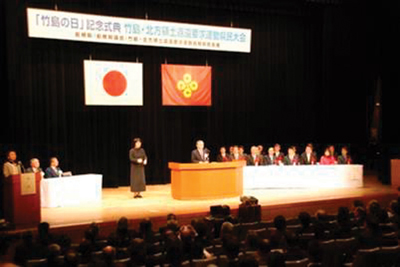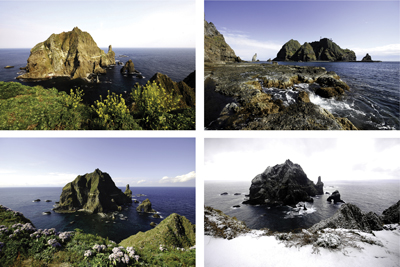- Dokdo in the East Sea
- Educational material
- High School Version
Dokdo in the East Sea
Table of Contents Open Contents
3. Korea-Japan Relations and Dokdo
-
- Objectives
-
Explain the reason for Shimane Prefecture’s “Takeshima Day” ordinance.
Seek positive ways to improve Korea-Japan relations.
-
- Critical Thinking
-
A Shimane Prefecture ordinance declared “Takeshima Day” to further perpetuate Japan’s sovereignty claims to Dokdo. Recently, Japan has included the subject of Dokdo in elementary, junior high, and high school social studies and history classes. And even Japan’s Ministry of Foreign Affairs website contains Dokdo-related content. What is the reason for Japan’s continued efforts toward Dokdo education and public relations?
Japan’s Establishment of ‘Takeshima Day’ and the Tension between Korea and Japan
On March 16, 2005, the Shimane Prefecture Assembly voted on the “Ordinance for the Establishment of Takeshima Day.” February 22 was selected for the date for “Takeshima Day” as that was the date on which the governor of Shimane Prefecture announced the annexation of Dokdo. The year 2005 marked the centennial anniversary of Japan’s illegal annexation of Dokdo. This act was an indication of the lack of historical awareness by officials in the Shimane Prefecture Assembly.
As a result of this ordinance, diplomatic tension between Korea and Japan proliferated from the central government level down to the local level. In response to “Takeshima Day,” the Masan City Assembly of South Gyeongsang-do declared “Taemado Day” in April 2005, and the North Gyeongsang-do declared “Dokdo Month” in June. Due to their geographic proximity, North Gyeongsang-do and Shimane Prefecture had an active relationship. However, the declaration of “Takeshima Day” by Shimane Prefecture quickly exacerbated relations.
The celebration for “Takeshima Day” in 2011 was an unusual one. The scope of the event had grown, and it was the first time that government officials attended the event. An official from the ruling Liberal Democratic Party and 14 lawmakers attended. Shimane Prefecture requested the central government’s attention and support for the Dokdo dispute as the government had done in the Kuril Islands dispute with Russia. Since the declaration of “Takeshima Day,” Shimane Prefecture’s claims are showing signs of gradually spreading throughout Japan.
The Japanese government shifted educational policies toward nationalism in 2006. As a result, territory education topics have been appearing in elementary, junior high, and high school courses and reference manuals.
In particular, the reference manual for junior high school social studies published in July 2008 noted that the amount of effort spent towards education about the well-known Kuril Islands dispute must be spent on the Dokdo dispute, as well. The reference manual for high school education published on December 12 described the need for a continuation of “education based in junior high school.” The “course of study” and the “reference manual” both have a significant influence on the way textbooks are devised.
The following textbooks based on this concept have described Dokdo as Japanese territory: five different fifth grade elementary level social studies textbooks, four different junior high level geography textbooks, and seven different junior high level civics textbooks. In addition, 13 out of 14 different high school geography textbooks describe Dokdo as Japanese territory. This new material has been taught to fifth grade elementary students since April 2011. Junior high school and high school students have been taught this since 2012 and 2013, respectively.
-
- Activity 1
-
Discuss whether a “Dokdo Day” is required as a response to “Takeshima Day.”
Tensions Between Japan and Neighboring Countries over Territory Disputes
The Meiji Restoration in 1868 started Japan’s modernization. As a late imperialist country, Japan invaded Taiwan in 1874 and continued to expand its territory. The Bonin (Osagawara) Islands in 1876, the Diaoyu (Senkaku) Islands after the Sino-Japanese War of 1894-1895, and Dokdo in 1905 were all annexed by Japan.
The Treaty of Saint Petersburg (May 1875) between Japan and Russia stipulated that Japan give up claims to Sakhalin Island in exchange for sovereignty over all the Kuril Islands. Russia occupied the Kuril Islands immediately after the end of World War II in 1945. Although Japan ceded the Kuril Islands to Russia in accordance with the San Francisco Peace Treaty, Japan has claimed that four of the islands are not part of the Kuril Islands. These islands are Habomai Rocks, Shikotan Island, Kunashiri Island, and Etorofu Island.
Japan issues a Defense White Paper every year. The 1997 edition stated, “In the Asia-Pacific region … issues related to the Northern Territories (Kuril Islands), Takeshima, the Korean Peninsula, the Nansha Islands, and other territories remain unsettled.”
Since 2005, Japan has reiterated territorial claims by stating that “issues related to the Northern Territories and Takeshima remain unsettled.” This situation has caused tension with both Russia and Korea. On September 7, 2010, the Japan Coast Guard seized a Chinese fishing vessel that had collided with a Japanese patrol boat in waters near the disputed Senkaku Islands. This incident has caused severe diplomatic friction between China and Japan.
-
- Activity 2
-
Japan has suggested that Dokdo’s territorial dispute should be resolved in the International Court of Justice. Identify the reason for this suggestion and its potential problems.
A Message for the Future
Due to globalization, we live in a world in which people are free to travel to any country and interact with any society. Causing disputes with a desire for another country’s territory is anachronistic.
The Japanese government’s claim to Dokdo, much like the claim that the annexation of Korea was legal, is baseless and not logical.
No matter how long Japan claims Dokdo as Japanese territory, Korea’s sovereignty over Dokdo is firm. Should Korea overreact or respond emotionally to Japan’s claims, Korea may become entwined in a situation that would prove favorable for Japan. A calm, logical refutation of Japan’s claims on the basis of law and historical facts will ensure that such claims slowly lose power.
Meanwhile, there is a need for Koreans to curb their excessive nationalism. As neighboring countries, Korea and Japan are companions that must write their future histories together. Conflicts in East Asia need to be resolved from deeper and wider perspectives, rather than by simply disavowing the other country. There is a need for conscientious action and cooperation by both countries for a prosperous future. More than anything else, there is a need to instill wisdom in future generations.
nationalism
The policy or doctrine of asserting the interests of one's own nation as separate from the interests of other nations or the common interests of all nations.
닫기













